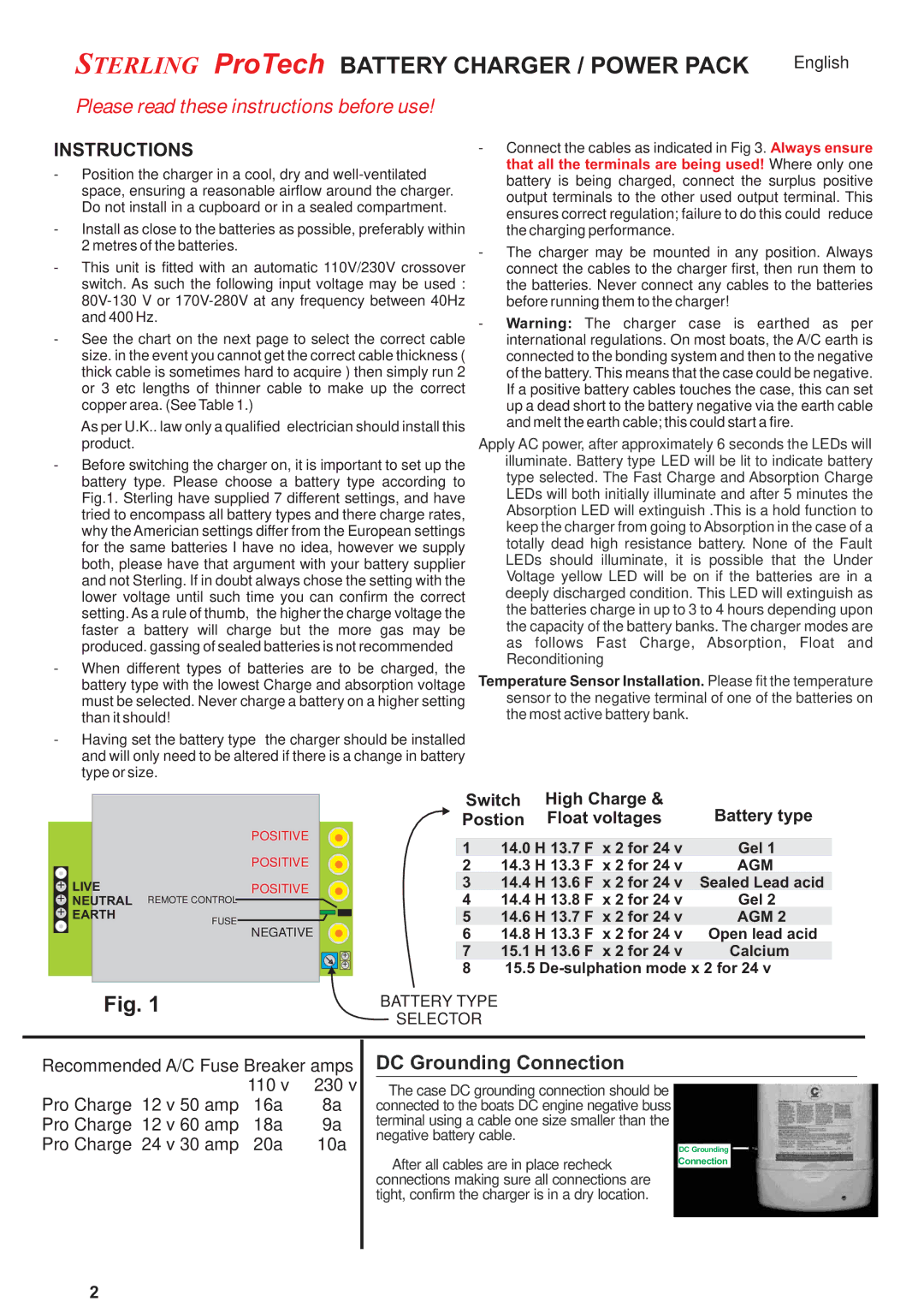
STERLING ProTech BATTERY CHARGER / POWER PACK English
Please read these instructions before use!
INSTRUCTIONS
-Position the charger in a cool, dry and
-Install as close to the batteries as possible, preferably within 2 metres of the batteries.
-This unit is fitted with an automatic 110V/230V crossover switch. As such the following input voltage may be used :
-See the chart on the next page to select the correct cable size. in the event you cannot get the correct cable thickness ( thick cable is sometimes hard to acquire ) then simply run 2 or 3 etc lengths of thinner cable to make up the correct copper area. (See Table 1.)
As per U.K.. law only a qualified electrician should install this product.
-Before switching the charger on, it is important to set up the battery type. Please choose a battery type according to Fig.1. Sterling have supplied 7 different settings, and have tried to encompass all battery types and there charge rates, why the Americian settings differ from the European settings for the same batteries I have no idea, however we supply both, please have that argument with your battery supplier and not Sterling. If in doubt always chose the setting with the lower voltage until such time you can confirm the correct setting. As a rule of thumb, the higher the charge voltage the faster a battery will charge but the more gas may be produced. gassing of sealed batteries is not recommended
-When different types of batteries are to be charged, the battery type with the lowest Charge and absorption voltage must be selected. Never charge a battery on a higher setting than it should!
-Having set the battery type the charger should be installed and will only need to be altered if there is a change in battery type or size.
-Connect the cables as indicated in Fig 3. Always ensure that all the terminals are being used! Where only one battery is being charged, connect the surplus positive output terminals to the other used output terminal. This ensures correct regulation; failure to do this could reduce the charging performance.
-The charger may be mounted in any position. Always connect the cables to the charger first, then run them to the batteries. Never connect any cables to the batteries before running them to the charger!
-Warning: The charger case is earthed as per international regulations. On most boats, the A/C earth is connected to the bonding system and then to the negative of the battery. This means that the case could be negative. If a positive battery cables touches the case, this can set up a dead short to the battery negative via the earth cable and melt the earth cable; this could start a fire.
Apply AC power, after approximately 6 seconds the LEDs will illuminate. Battery type LED will be lit to indicate battery type selected. The Fast Charge and Absorption Charge LEDs will both initially illuminate and after 5 minutes the Absorption LED will extinguish .This is a hold function to keep the charger from going to Absorption in the case of a totally dead high resistance battery. None of the Fault LEDs should illuminate, it is possible that the Under Voltage yellow LED will be on if the batteries are in a deeply discharged condition. This LED will extinguish as the batteries charge in up to 3 to 4 hours depending upon the capacity of the battery banks. The charger modes are as follows Fast Charge, Absorption, Float and Reconditioning
Temperature Sensor Installation. Please fit the temperature sensor to the negative terminal of one of the batteries on the most active battery bank.
|
| POSITIVE |
|
| POSITIVE |
+ | LIVE | POSITIVE |
+ | NEUTRAL | REMOTE CONTROL |
+ | EARTH | FUSE |
| ||
|
| |
|
| NEGATIVE |
Fig. 1
+
+
Switch | High Charge & | Battery type | |
Postion | Float voltages | ||
|
|
| |
1 | 14.0 H 13.7 F x 2 for 24 v | Gel 1 | |
2 | 14.3 H 13.3 F x 2 for 24 v | AGM | |
3 | 14.4 H 13.6 F x 2 for 24 v | Sealed Lead acid | |
4 | 14.4 H 13.8 F x 2 for 24 v | Gel 2 | |
5 | 14.6 H 13.7 F x 2 for 24 v | AGM 2 | |
6 | 14.8 H 13.3 F x 2 for 24 v | Open lead acid | |
7 | 15.1 H 13.6 F x 2 for 24 v | Calcium | |
8 | 15.5 | ||
BATTERY TYPE
SELECTOR
Recommended A/C Fuse Breaker amps
|
| 110 v | 230 v |
Pro Charge 12 v 50 amp | 16a | 8a | |
Pro Charge | 12 v 60 amp | 18a | 9a |
Pro Charge | 24 v 30 amp | 20a | 10a |
DC Grounding Connection
The case DC grounding connection should be connected to the boats DC engine negative buss terminal using a cable one size smaller than the negative battery cable.
| DC Grounding |
After all cables are in place recheck | Connection |
| |
connections making sure all connections are |
|
tight, confirm the charger is in a dry location. |
|
2
